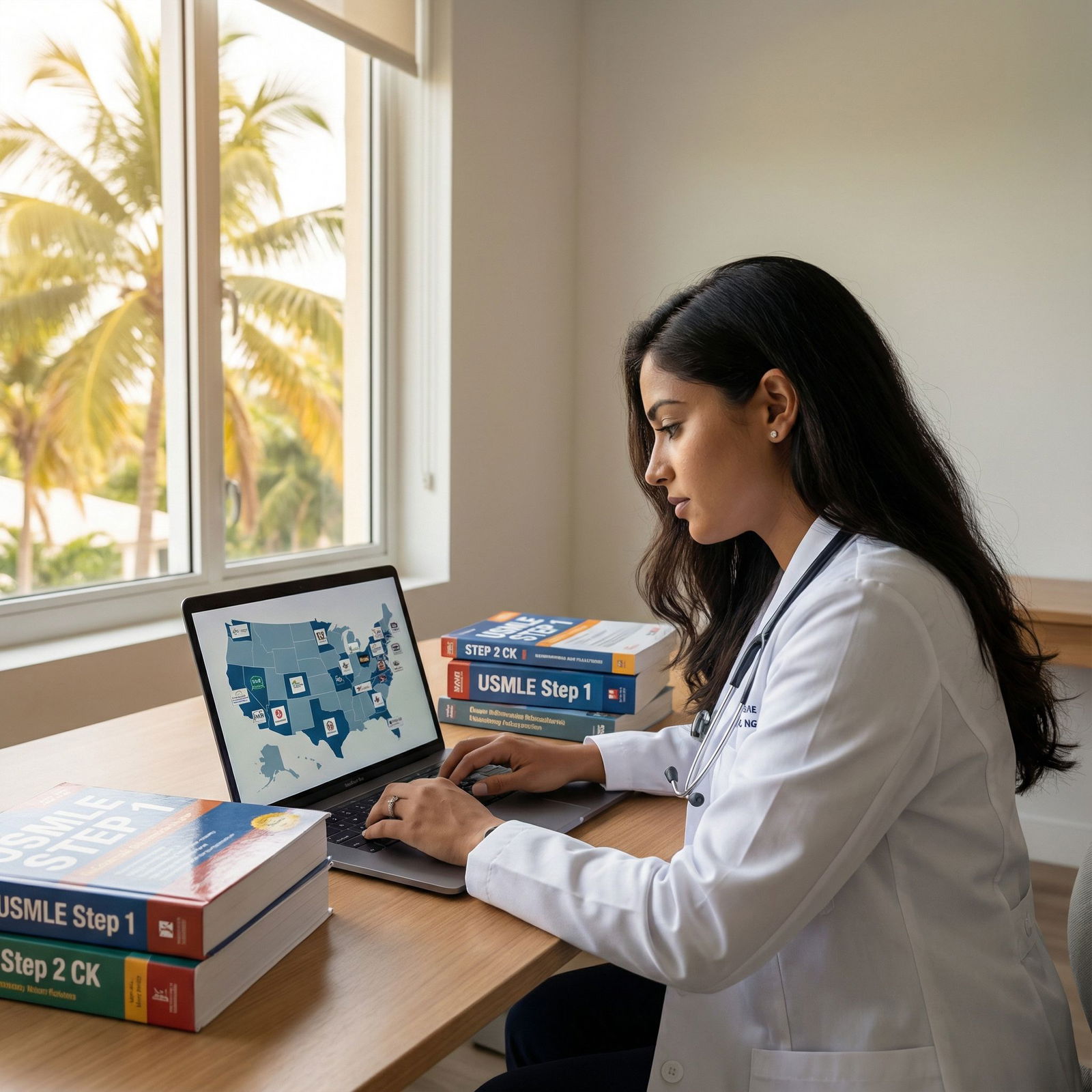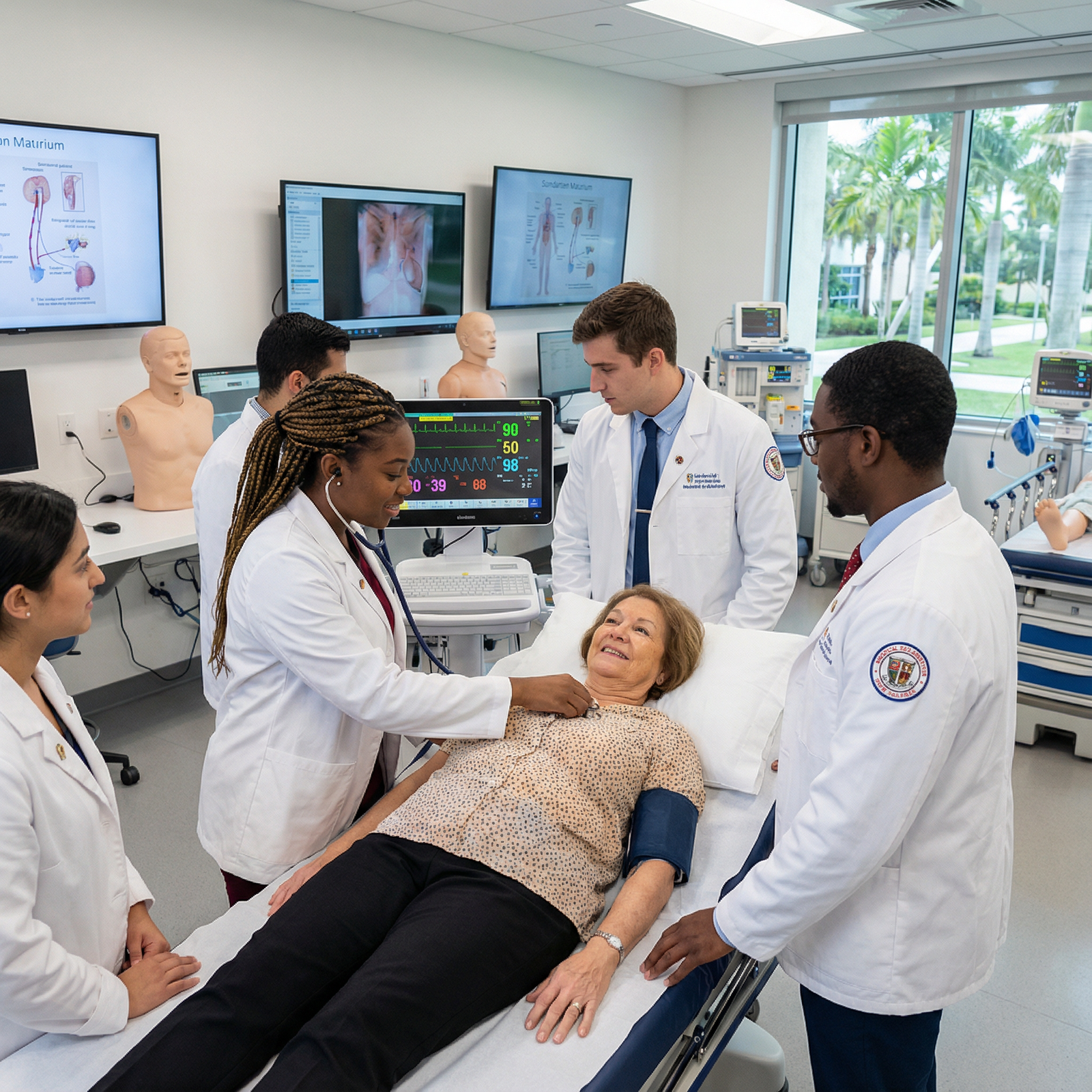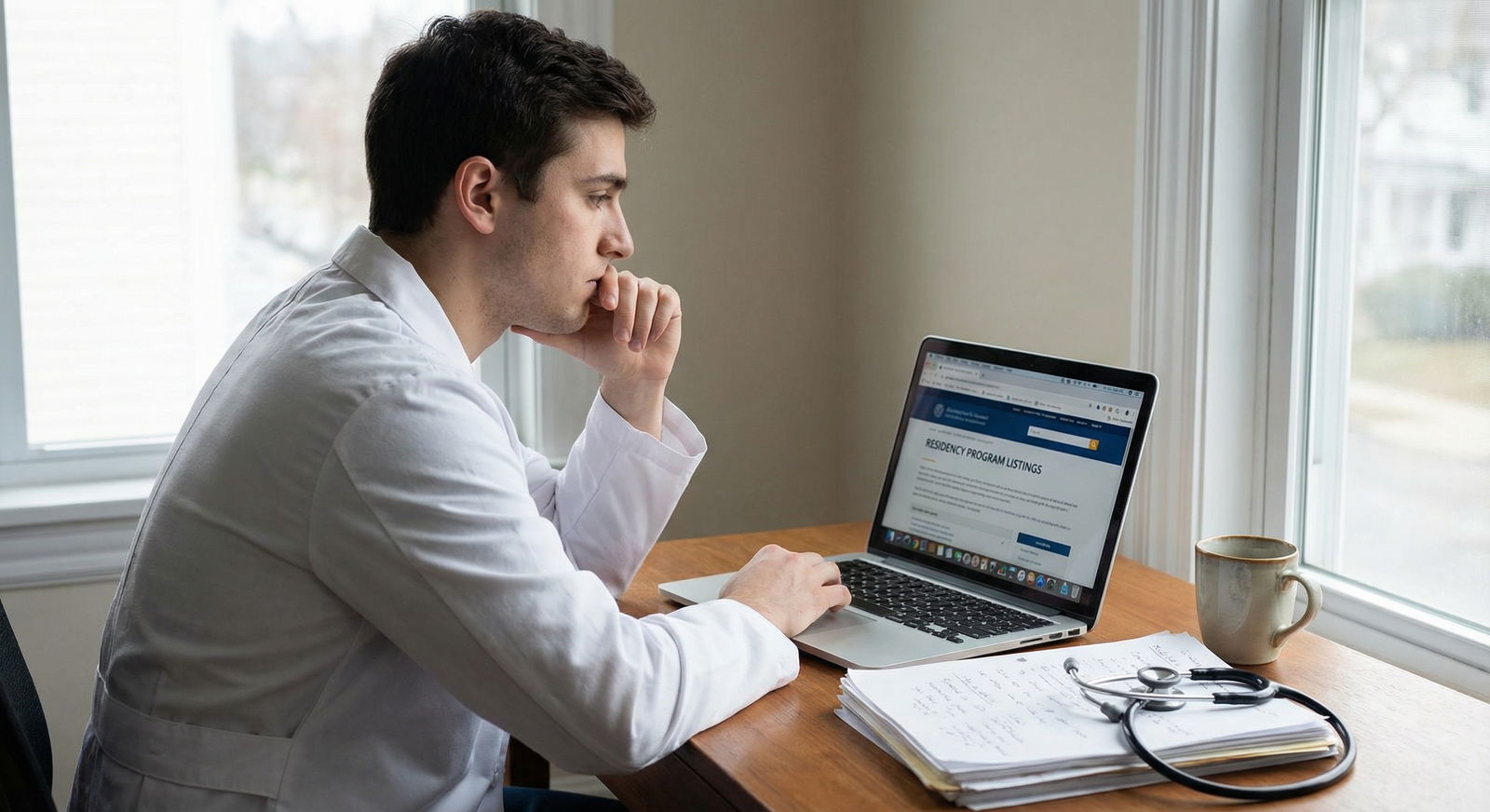
Transitioning from a Caribbean medical school to practicing medicine in the United States is a demanding but absolutely achievable path. For many International Medical Graduates (IMGs), especially those trained at Caribbean Medical Schools, the dream of securing a U.S. residency requires careful planning, early preparation, and strategic use of every opportunity during medical school.
This expanded guide walks you step-by-step through what you should be doing—starting as early as premed and continuing through your clinical years—to successfully transition into U.S. residency training.
Understanding the Caribbean-to-U.S. Pathway as an IMG
Caribbean medical schools have become an important route for many students who want to practice in the United States but either did not gain entry to U.S. MD/DO programs or chose a different pathway for personal or financial reasons. However, this pathway comes with unique challenges:
- Greater scrutiny from residency program directors
- High expectations for exam scores and clinical performance
- The need to prove your readiness for the U.S. healthcare environment
The Reality for Caribbean-Trained International Medical Graduates
Caribbean-trained International Medical Graduates can and do match into U.S. residency programs every year—including competitive specialties. However, compared with U.S. MD graduates, they typically need:
- Stronger USMLE Step scores
- More deliberate networking in medicine
- More targeted U.S. clinical experience
- Clear evidence of professionalism, reliability, and resilience
If you accept these realities early and plan your strategy around them, you significantly increase your chances of a successful U.S. residency match.
Why Students Choose Caribbean Medical Schools—and What It Means for Your Future
Caribbean medical schools offer a viable and important option, particularly for non-traditional applicants or those with academic setbacks. But the decision should be informed and strategic.
Advantages of Caribbean Medical Schools
More Flexible Admissions
Schools are often more open to:- Non-traditional students
- Career changers
- Students with lower GPAs or MCAT scores who have demonstrated improvement or potential
Rolling or Multiple Entry Dates
Many schools offer several start dates throughout the year, allowing students to begin sooner rather than waiting a full admissions cycle.Accelerated or Year-Round Programs
Some programs operate on a trimester calendar, allowing students to complete preclinical training more quickly and move into clinical rotations sooner.English-Based Curriculum
Major Caribbean medical schools teach in English and design their curricula to align closely with U.S. medical education and USMLE content.
Important Realities and Considerations
However, attending a Caribbean medical school also means:
You must be highly self-directed.
You cannot assume your degree alone will open doors. Your exam scores, clinical performance, and professionalism are heavily weighted.You will be evaluated as an IMG.
Even if you are a U.S. citizen, you are considered an International Medical Graduate if your medical school is outside the United States and Canada.Research school outcomes carefully.
Compare:- USMLE pass rates
- Residency match rates (and which specialties/states)
- Clinical affiliation sites in the U.S.
- Graduate success stories
Choosing a Caribbean school can work very well if you go in with a clear understanding that you’ll need to outperform, not just “keep up.”

Step 1: Master U.S. Medical Licensing Requirements Early
A successful transition to U.S. residency starts with fully understanding the Medical Licensing Requirements for International Medical Graduates. Your entire strategy in preclinical and clinical years should align with these requirements.
ECFMG Certification: Your Gateway to U.S. Residency
The Educational Commission for Foreign Medical Graduates (ECFMG) certifies that IMGs are ready to enter U.S. residency programs. Without ECFMG certification, you cannot start an ACGME-accredited residency in the U.S.
To obtain ECFMG certification, you must:
Attend an Approved Medical School
- Confirm that your school is recognized in the World Directory of Medical Schools with an ECFMG “sponsor note.”
- Check this before you enroll and periodically during school.
Pass Required Examinations
As of now, this includes:- USMLE Step 1 (primarily basic sciences)
- USMLE Step 2 CK (Clinical Knowledge)
Step 2 CS has been permanently discontinued; its former role in assessing clinical skills is now addressed through other ECFMG pathways and school-based assessments.
Meet ECFMG’s Clinical and Documentation Requirements
- Submit primary-source verified medical school transcripts and diploma
- Fulfill any country- or school-specific requirements as listed on the ECFMG website
Strategic USMLE Preparation for Caribbean Students
Caribbean medical students often face intense pressure to perform very well on USMLE exams to offset concerns some programs may have about their schools.
Actionable strategies:
Start with the end in mind (from Day 1):
- Use USMLE-style resources (e.g., UWorld, NBME self-assessments, question banks) alongside your basic science coursework.
- Align your class studying with USMLE content outlines.
Create a multi-phase study plan:
- Phase 1 (Preclinical): Build strong foundational understanding, not just memorization.
- Phase 2 (Dedicated): 6–12 weeks of focused exam preparation, depending on your baseline.
- Phase 3 (Pre-Step 2 CK): Integrate clinical knowledge during your core clerkships.
Use data to guide your preparation:
- Take NBME practice exams and adjust your timeline if needed.
- Seek help early if your scores plateau or decline.
Residency programs often use USMLE Step scores as a screening tool, especially for IMGs. Competitive scores can compensate for many other perceived disadvantages.
Step 2: Secure High-Quality U.S. Clinical Experience
U.S. Clinical Experience (USCE) is one of the most important components of an IMG application to U.S. residency. For Caribbean students, this is a major advantage because many schools have established U.S. clerkship affiliations.
Types of U.S. Clinical Experience
Core Clerkships
Typically include Internal Medicine, Surgery, Pediatrics, OB/GYN, Psychiatry, and Family Medicine. For Caribbean students, these are often arranged by the school at partner hospitals.Elective Rotations in Desired Specialty
Critical for specialties like Internal Medicine, Pediatrics, Psychiatry, and especially competitive fields (e.g., Radiology, Anesthesiology, some subspecialties).Sub-Internships (Sub-Is) or Acting Internships
In Internal Medicine, Surgery, or other fields—these show you can function close to the level of an intern.Externships/Observerships (if already graduated)
Less impactful than core/elective rotations done as a student, but still valuable if you need more recent U.S. experience.
How to Maximize Your Rotations
To make your U.S. rotations stand out to program directors:
Show up early and prepared
- Pre-read on your patients’ conditions and guidelines.
- Know their labs, imaging, and hospital course before rounds.
Act like a junior resident
- Volunteer to present patients.
- Follow through reliably on every task.
- Offer to help interns and residents with appropriate responsibilities.
Document your achievements
- Keep a log of:
- Number and types of patients seen
- Procedures you observed or participated in
- Feedback and commendations received
- Keep a log of:
Target your specialty interests
- If you’re aiming for Internal Medicine, prioritize IM core rotations at teaching hospitals, then IM electives at programs where you might realistically match.
- If you are unsure, choose broad-based rotations in fields with larger residency cohorts (e.g., IM, Family Medicine, Pediatrics).
Strong performance during U.S. rotations leads directly to strong Letters of Recommendation and meaningful Networking in Medicine, which are crucial for IMGs.
Step 3: Build a Competitive Residency Application as a Caribbean IMG
Once ECFMG certification is in progress and you have U.S. clinical experience, the next step is building a strong Electronic Residency Application Service (ERAS) application.
Key Components of a Strong IMG ERAS Application
USMLE Step Scores
- Aim for scores at or above the average for U.S. MD seniors in your target specialty.
- Avoid large gaps between Step 1 and Step 2 CK score performance.
- If you needed a retake, be ready to explain it honestly and reflectively.
Letters of Recommendation (LoRs)
For IMGs, LoRs from U.S.-based physicians are particularly valuable.Prioritize:
- Letters from academic faculty at teaching hospitals
- Letters from your desired specialty
- Writers who know you well and can provide detailed, concrete examples
How to secure strong letters:
- Tell attendings early that you are hoping for a letter and ask what they expect for a strong endorsement.
- Update them with your CV and personal statement when they write.
Personal Statement
Use it to:- Explain your path (including why Caribbean medical school)
- Highlight resilience, maturity, and growth
- Articulate a clear, realistic specialty choice and long-term goals in U.S. healthcare
Curriculum Vitae (CV) and Experiences Section
Include:- Leadership roles (student organizations, community outreach)
- Research or quality improvement projects (even small ones)
- Volunteer experiences, especially in medically underserved or diverse populations
- Teaching or tutoring roles, which demonstrate communication and leadership
Program Signaling and Application Strategy
- Target programs that have historically accepted IMGs or Caribbean graduates.
- Use tools like FREIDA and program websites to evaluate:
- IMG-friendliness
- Visa sponsorship policies (if applicable)
- Program size and location
Applying broadly and strategically is essential for many IMGs.
Step 4: Excel in Residency Interviews as an International Medical Graduate
Even with strong scores and experience, your U.S. residency interview performance can make or break your chances—particularly as an IMG from a Caribbean medical school.
Preparing for Common Interview Themes
You will almost certainly face questions about:
- Your decision to attend a Caribbean medical school
- Your understanding of the U.S. healthcare system
- How you’ve adapted to challenges or setbacks
- Why you chose this specialty and this specific program
Prepare concise, honest, and reflective responses that:
- Take ownership of your decisions and growth
- Emphasize resilience, maturity, and adaptability
- Highlight specific examples from rotations, research, or life experience
Practical Steps for Interview Readiness
Mock Interviews
- Practice with advisors, mentors, or peers.
- Ask for feedback on clarity, confidence, and body language.
- Record yourself (video) and review your responses and nonverbal cues.
Know Your Application Inside Out
- Be ready to discuss any experience, gap, or grade.
- Have a story ready for each major entry on your CV.
Program-Specific Preparation
- Review each program’s:
- Mission statement
- Patient population
- Clinical strengths (e.g., academic vs. community, fellowship programs)
- Prepare thoughtful questions that show you understand and value what makes that program unique.
- Review each program’s:
Virtual Interview Skills (if applicable)
- Ensure a quiet, well-lit space with professional background.
- Test your internet connection, audio, and video well in advance.
- Dress in full professional attire (not just from the waist up).
Interviewers are asking themselves: “Would I trust this person to care for my patients and to be my colleague at 2 a.m.?” Your goal is to leave them with a confident “yes.”
Step 5: Use Networking in Medicine and Mentorship to Your Advantage
For Caribbean International Medical Graduates, who often lack the built-in network of a U.S. medical school, intentional Networking in Medicine is a powerful equalizer.
Strategic Networking Approaches
Professional Organizations
- Join national groups such as:
- American Medical Association (AMA)
- American College of Physicians (ACP)
- American Academy of Family Physicians (AAFP)
- Specialty-specific organizations (e.g., APGO, APA, AAP)
- Attend student or trainee-focused sessions and IMG working groups.
- Join national groups such as:
Conferences and Regional Meetings
- Apply for poster presentations (case reports, QI projects, small research projects).
- Approach faculty at poster sessions or after talks—introduce yourself briefly and follow up via email or LinkedIn.
Online Platforms
- LinkedIn: Maintain an up-to-date, professional profile.
- Specialty interest groups, forums, and alumni groups.
- Engage respectfully—ask focused questions, share educational content, and follow up on advice you receive.
Finding and Working with Mentors as a Caribbean IMG
Where to Look for Mentors
- Caribbean school alumni in U.S. residency or practice
- Attendings and chief residents from your U.S. rotations
- Faculty encountered at conferences or online meetings
How to Be a Good Mentee
- Be respectful of their time—come prepared with specific questions.
- Follow through on advice and update them on your progress.
- Show gratitude—and pay it forward later in your career.
Mentorship doesn’t just help with match strategy; it also supports emotional resilience, professionalism, and long-term career planning.
Step 6: Stay Current with U.S. Healthcare Developments and Practice Standards
Being an effective resident in the U.S. means practicing evidence-based medicine and understanding the structure and challenges of the U.S. healthcare system.
Staying Clinically Up-to-Date
Continuing Medical Education (CME) and Online Courses
- Participate in free or low-cost CME from reputable sources:
- NEJM, JAMA, ACP, AAFP, specialty societies
- Coursera or edX courses on U.S. healthcare systems and public health
- Participate in free or low-cost CME from reputable sources:
Regular Reading Habits
- Follow:
- Major journals in your chosen specialty
- Key guideline-producing organizations (e.g., USPSTF, ACC/AHA)
- Use summaries (e.g., UpToDate, DynaMed) to stay efficient but verify with primary sources when needed.
- Follow:
Understand U.S. Healthcare Structure
- Learn the basics of:
- Insurance models (Medicare, Medicaid, private)
- Quality metrics and value-based care
- Social determinants of health and health disparities
- Learn the basics of:
Demonstrating this understanding in interviews and during rotations reassures programs that you are ready to integrate smoothly into the U.S. medical environment.

Frequently Asked Questions: Caribbean Medical Schools and U.S. Residency
1. Is it really possible to match into a U.S. Residency from a Caribbean Medical School?
Yes. Every year, a substantial number of Caribbean-trained International Medical Graduates match into U.S. residency programs across many specialties—particularly in Internal Medicine, Family Medicine, Pediatrics, Psychiatry, and some categorical Surgery and Transitional Year programs.
Your chances are highest if you:
- Choose a Caribbean school with a solid track record of U.S. residency placements
- Score competitively on USMLE Step 1 and Step 2 CK
- Obtain strong Letters of Recommendation from U.S.-based physicians
- Apply broadly and thoughtfully, focusing on IMG-friendly programs
While it is more challenging than the U.S. MD route, it is achievable with deliberate strategy and consistent excellence.
2. How important is U.S. clinical experience compared with experience in my home country?
For U.S. residency applications, U.S. clinical experience (USCE) is generally more heavily weighted than international experience. Program directors value:
- Familiarity with U.S. hospital workflows and documentation
- Demonstrated ability to function in multidisciplinary teams in the U.S.
- Direct observation by U.S. faculty who can write strong, detailed recommendations
Experience in your home country still matters—especially for commitment to medicine and serving communities—but for final ranking decisions, U.S. experience is often more influential.
3. What should I emphasize in my personal statement as a Caribbean IMG?
Consider emphasizing:
- Your path and motivation: Why medicine, and why now?
- Your decision to attend a Caribbean Medical School: Briefly and positively explain the context without defensiveness.
- Resilience and growth: Describe specific challenges you faced and how you adapted and improved.
- Commitment to your chosen specialty: Use concrete clinical experiences and patient stories that shaped your interest.
- Fit with U.S. healthcare: Highlight experiences that show you understand and embrace the responsibilities of practicing in the U.S.
Avoid turning your personal statement into a “justification” for your school choice; instead, focus on maturity, insight, and future potential.
4. Do I need research to match into a U.S. residency as an IMG from a Caribbean school?
Research is not mandatory for all specialties, but it helps:
- For more competitive fields (e.g., Radiology, Anesthesiology, Dermatology, some subspecialties), research is highly valuable.
- For primary care–oriented fields (Internal Medicine, Family Medicine, Pediatrics), research is helpful but not essential. Quality improvement projects, case reports, and clinical poster presentations can strengthen your application.
If your school has limited research infrastructure:
- Look for remote or short-term projects with U.S.-based mentors.
- Present case reports or quality improvement projects from your rotations at local or national meetings.
5. How early should I start planning my U.S. residency strategy as a Caribbean medical student?
The earlier, the better—ideally:
- Before enrolling: Research match statistics, exam pass rates, and clinical affiliations.
- First year (preclinical): Begin integrating USMLE-style studying and exploring specialties of interest.
- Second year: Plan Step 1 timing and begin thinking about which U.S. rotation sites and specialties to prioritize.
- Clinical years: Focus on performance in U.S. rotations, securing LoRs, taking Step 2 CK, and building your ERAS application.
Planning from the start allows you to avoid common pitfalls like delayed exams, minimal U.S. experience, or last-minute scrambling for letters.
Transitioning from a Caribbean medical school to U.S. residency as an International Medical Graduate is a demanding journey—but it is also a path that has led thousands of determined students to fulfilling careers in American medicine. By understanding Medical Licensing Requirements, strategically using U.S. clinical rotations, excelling on USMLE, investing in Networking in Medicine and mentorship, and staying informed about U.S. healthcare developments, you can position yourself as a strong, competitive candidate for U.S. residency programs.




















